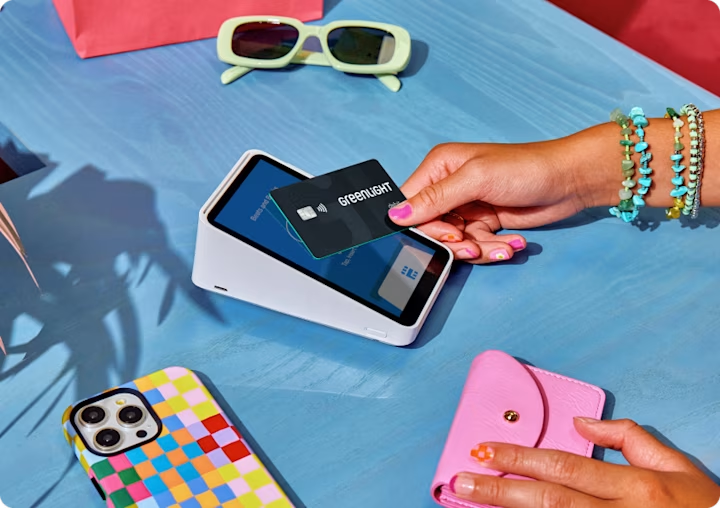
What is a transaction? A kid-friendly money lesson that sticks

Hey, $mart parents 💡
Bring money lessons home with Greenlight’s $mart Parent newsletter, a quick read with impactful tips — delivered free to your inbox weekly.
What is a transaction? A kid-friendly money lesson that sticks
Let’s say your teen grabs a smoothie after school and pays with their debit card. That little moment (tap, paid, done) is a transaction. And once kids and teens start managing their own money, these moments start stacking up fast.
So, what is a transaction, really? It’s just the movement of money from one place to another. For kids and teens, understanding that movement is one of the first steps toward building confidence with money.
What counts as a transaction?
Any time money moves in or out of your account, that’s a transaction. It could be buying something online, getting paid for your first job, or sending your friend $10 for pizza. If money’s going somewhere (or showing up), it counts.
And it’s not just about spending. Transactions take lots of forms:
Buying something. Lunch, Roblox credits, and school supplies all fall under the “you spent money” category.
Getting paid. Whether it’s allowance for doing chores or a paycheck, if it hits your account, that’s also a transaction.
Moving money around. Transferring cash to savings or when a parent sends gas money? Yep, still a transaction.
ATM stops. Withdrawing or depositing cash also makes the list.
Refunds. When you return something, that’s money coming back to you, and it’s a transaction, just in reverse.
Transactions can happen in a store, on your phone, or behind the scenes through automated transfers. It’s less about how and more about what’s happening: money is changing hands, and that moment gets recorded.
Where transactions show up (and why your kids should look)
Most kids aren’t logging into a bank account to scroll through statements. But with an app like Greenlight, transactions appear in real-time and in plain language.
They see:
The amount deposited or withdrawn from the account
The date of the transaction
The store name (or app)
Whether the transaction is pending or complete
Watching money move in and out of their account as it happens can make it feel a lot more real. Plus, they’re more likely to notice a random charge they don’t remember. Or realize they’ve been buying more snacks than they thought. Once kids start checking regularly, they’re more likely to catch those little patterns and adjust before things get out of hand.
Why it's worth paying attention to transactions
Kids and teens are just beginning to lay the foundation for financial literacy. When they understand how money flows in and out, they start to:
Notice how fast small purchases add up
Head off impulse spending
Take a closer look when something looks off
Start to build habits around tracking and planning
When kids start to get how transactions work, it clicks: where their money goes, how fast it adds up, and what’s left to save. From there, concepts like budgeting and saving become clearer.
How Greenlight helps kids connect the dots
One thing families love about Greenlight is that they don’t have to wonder where their money went. Every time kids and teens spend, save, or get paid, it shows up instantly in the app. They can scroll through their activity, spot where their money’s going, and see it all broken out by category. Even their earnings from chores or allowance show up in real time.
But it doesn’t stop there. Greenlight helps kids stay engaged in learning with built-in educational games that make money lessons fun.
And since parents stay informed, you can keep an eye on things. It’s a way to stay connected and support smart decisions, saving, giving, and growing their money for the future.
When kids can see the whole picture, they learn more than just what a transaction is. They begin to understand how to manage money and make it work for them.
Want to budget as a family? Teach your kids essential budgeting skills with Greenlight’s award-winning educational money app. Try Greenlight, one month, risk-free.*
Share via
